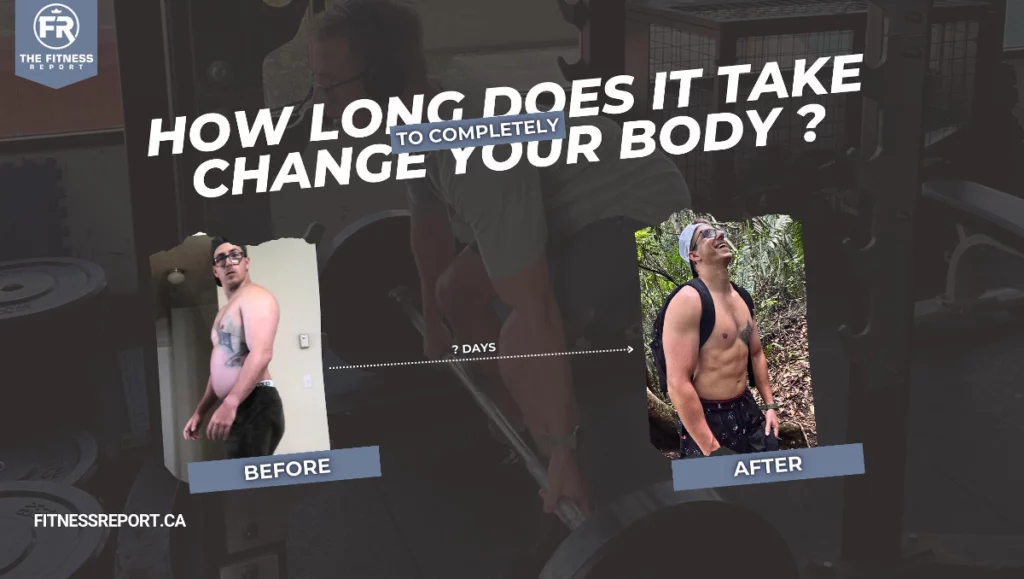How Often Should I Go To The Gym? (Find Out Here)
- How Often Should A Beginner Go To The Gym?
- What Is The Best Gym Schedule?
- How Long Does It Take To Change Your Body Completely?
- How Often Should I Go To The Gym: Breaking Down Your Goal
- How Many Rest Days Per Week Should You Take?
- How Of Often Should I Go To The Gym: Frequently Asked Questions (FAQs)
- Conclusion
How often should I go to the gym? This question is often asked by new gym goers, and individuals training for a specific goal such as a physique contest, CrossFit meet or a Strongman competition. The truth is that there is no fixed answer to how often you should go to the gym. The number of times depends on an individual’s body goals and objectives. Ask yourself whether you are just trying to stay healthy, gain muscle mass, or want to lose weight before moving further.
A general rule of thumb followed by gym goers is 3 to 5 times per week. If you’ve just started going to the gym, even twice per week should suffice. You do not need to overdo it immediately and make things complicated so your body has sufficient time to adapt, adjust and rest.
You can begin with 2 to 3 weekly sessions and gradually increase the frequency as you adapt. Consider your experience level inside the gym if you are not a newbie. If you have of years of experience, and know your body inside out you could potentially visit 6 times per week.
How Often Should A Beginner Go To The Gym?
If you are a complete beginner and new to the gym, you should take your time to figure out what your goals are, then start to plan workouts. Pressuring yourself to go to the gym for 1 hour daily can be too much initially. Remember that you do not want to burn yourself out or cause an injury by pushing the body past its limit.
Going to the gym should be treated like a marathon and not a sprint, so starting with 2 to 3 days and then progressing forward is a smart idea. Your goal should be to find a workout routine that serves you best and one that you can commit to regularly. Begin with short workouts that have a duration of 40 minutes or less.
As you slowly feel that you are building strength, add a few more minutes each week. If you are still unsure, it may be smart to contact a friend who goes to the gym regularly for advice. You can work with a personal trainer or even follow exercise-related social media pages.
What Is The Best Gym Schedule?
The best gym schedule is the one that you can stay the most committed to. For some people, this may only be 2 days per week, while others can easily make it to the gym Monday through Friday with no questions asked.
The game’s name here is “long-term consistency,” and this will be the best gym schedule for you. And yes, it is okay to miss workouts occasionally; we all have priorities outside the gym.
The true answer lies in your personal goals and preferences, but generally, spending 45 minutes to an hour at the gym for each session and going 3 to 5 times weekly should be a good start. If you are a beginner, even 20 to 30-minute sessions should suffice. You can gradually increase the time and you build strength.
Note that the type of exercise being performed will also determine how long you can hold out at the gym. Cardio sessions typically last longer, while weight lifting and training takes a shorter time.
How Long Does It Take To Change Your Body Completely?

This once again ties into what your goals are, but the most simple answer here is that it will take months to years to change your body completely. If you have failed to work out for 10 years, or forever, it will take you at least 2 months to accomplish fitness. This is if you are not obese and are willing to work out almost daily at a moderate level.
Exercising regularly over time helps maintain fitness and brings along added health benefits. Individuals with a solid cardio regimen that wish to gain muscle will require at least 3 months to show any results. If an individual is overweight or obese, it may take at least a year to get a muscular physique or build a 6-pack.
How Often Should I Go To The Gym: Breaking Down Your Goal

As discussed earlier, how often an individual must go to the gym has no definite answer. It depends entirely on your personal goals and the type of exercise you perform. However, it is still possible to calculate frequency by breaking down your gym goals. Let’s find out how you can do so below:
Going To The Gym To Improve Health + Wellness
By this I mean that just being active and keeping your body moving. You don’t want to sit at home and watch Netflix all night because you understand the benefits of exercise. If you hope to burn calories and build better endurance, 3 days of cardio and 2 days of strength training is a good idea.
Note that if you wish to tone your body and build muscle, then you should opt for 2 days of cardio and 3 days of strength training instead. Alternate every week to create a better balance.
Take two days off to promote ‘active rest’ with just 20 to 30 minutes of physical activity. Go for a walk to the park, perform chores, clean the yard, or play with your kids.
Advantages
- 4 to 5 days of gym weekly helps create a balanced routine
- It keeps you active while allowing your body to rest and recover
- Boosts confidence and body image
- Helps maintain fitness levels
Drawbacks
- A busy life and hectic schedule may interfere with this regime
- Missing workouts can frustrate you and cause you to bail out completely
- If you end up going to the gym 3 times per week then your best bet is indulging in HIIT to make up for your busy schedule
- It may lead to boredom so switch machines, whirlpool and join fitness groups to stay motivated
- Opt for dancing, kickboxing, swimming, sports, or something new to stay energized
Going To The Gym For Weight Loss
Going to the gym for weight loss means you are interested in losing body fat or achieving a weight loss goal. For this, I recommend 60 to 90 minutes of moderately intense training. You must also watch your calories and be mindful of what you eat. Your diet will vary based on workout type, gender, weight, age, and eating habits.
The good news is that you do not need to spend all your time on aerobics and cardio machines. Just 2 to 3 days of resistance training weekly should be sufficient to build muscle and burn calories simultaneously. Opt for aerobic exercises for the remaining days.
Advantages
- Allows you to complete a daily workout regime in one session
- Allows you to train using various exercises during the five-day gym week
- Exercising for most of the week guarantees weight loss and better overall health
Drawbacks
- You may start super motivated but may start to lose energy slowly
- Suddenly going to the gym 5 times weekly may cause boredom, so switch up exercises if that happens
- Try kickboxing, swimming, treadmill running, aerobics, or a new sport to stay motivated
- Cut back on gym time by indulging in HIIT based on your fitness level
- Adjust caloric intake and workout intensity if you start feeling burned out.
Going To The Gym To Build Muscle
If you go to the gym to gain muscle, a 3 to 4-day regime focusing on 2 muscle groups per session is the best start. Remember to allow muscles to rest by switching days to ensure recovery. Alternatively, you can work on a single muscle group for 5 to 6 days weekly.
If you are an expert, you may want to go to the gym more often, but I suggest testing to ensure you do not overwork and tire your muscles. It is a good idea to visit a sauna or whirlpool or join a restorative yoga class to soothe sore muscles. A simple walk in the park may help too.
Advantages
- A 3 to 4-day workout week ensures sufficient rest
- Muscles grow during the recovery period, so this regime allows that
- Allows the nervous system to restart and revive
- Prevents overuse injuries and risk plateaus if done smartly
Drawbacks
- Allow yourself to rest for longer if required, as this is quite a stimulating regime
- This may lead to overuse of muscles and aches, in which case it is best to stop
Training For A Specific Sport or Event
Sports-related or event training tends to get very specific. It is a good idea to get in touch with your trainer to figure out the best possible regimen based on your fitness level, health, and any injuries or conditions. You will need excellent stamina to participate, so preparing beforehand is necessary.
If you have to train on your own, it is a good idea to research the venue, terrain, and event to develop a suitable training plan. Prepare well in advance if it is your first time participating and time your progress. Make sure you can meet goals without breaking any rules.
Get in touch with other athletes for more tips, and follow a healthy diet plan to help build strength and ensure you have sufficient energy. I would also suggest staying hydrated during training and the event to prevent dizziness and other health problems.
Further, you should make sure you have the right clothes and shoes that can prevent injuries. Your training regime should include bodyweight and cardio exercises that help build flexibility, jump strength, core strength, stability, and balance to ensure you can perform in the event’s specific physical and environmental conditions.
Additional Tips
- Use equipment similar to what you will be using at the event to train
- Eat a light meal with proteins and carbs before the event
- Carry a towel, snacks, water bottle, and any necessary equipment to the event
- Perform a warm-up before the actual event
- Start slowly and gradually increase speed and force once you start performing
- Remember it is important to finish and have fun; winning should not be the only end goal
How Many Rest Days Per Week Should You Take?

Rest days from working out are super important. This is where muscle building happens, so it is very important to get in proper sleep, hydration, and protein.
Note that since workouts differ for everyone based on their goals, abilities, and energy, the more strenuous the sessions are, the more rest an individual will need. Therefore, it is a good idea to work out 4 to 6 days per week and rest for 1 to 2 days.
What Happens If You Workout Everyday Without Rest?
If you do this, you are not going to get the results you will want to see. You will be tired, worn out, and ultimately your workouts will be ineffective. The body needs rest to prevent overworking and allow the muscles to adapt.
Muscles have an acute inflammatory response that drives the repair process when you work out. During the recovery stage, more and more blood and nutrients are transported to the muscles, which helps them grow and build strength. Therefore, skipping rest will prevent workout results from truly showing up.
How Of Often Should I Go To The Gym: Frequently Asked Questions (FAQs)

Conclusion
Nearly all individuals that sign up for a gym membership wish to get in shape one way or another. They either wish to lose weight or build muscle. However, to achieve these goals, much time will need to be spent in the gym. The question is how often should I go to the gym? While there is no fixed answer to this, as everyone’s body, goals, and diet are different, individuals should go to the gym at least 2 to 4 times per week and work out for at least 45 minutes to an hour.
This duration can be less or more, depending on whether you are an expert or a newbie. Remember that the goal is to get fit and stay healthy, and avoid overtraining. If you do not allow your body to heal and recover, it can lead to added damage and fatigue. You may end up feeling less energized, sustain an injury, or even stop feeling motivated.
Focus on the quality rather than quantity while training. Make sure to take a proper diet and stay hydrated. A caloric deficit combined with training will go a long way. Even though it may take years or months to reach the goal you have in mind, with a solid regime, you will start feeling fit in a short time!


